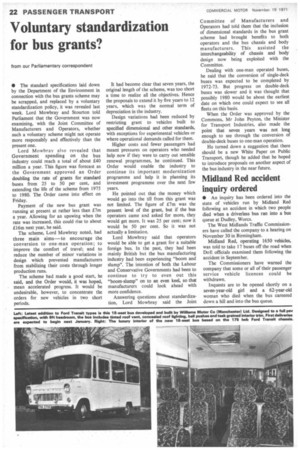Voluntary standardization for bus grants?
Page 24

If you've noticed an error in this article please click here to report it so we can fix it.
from our Parliamentary correspondent • The standard specifications laid down by the Department of the Environment in connection with the bus grants scheme may be scrapped, and replaced by a voluntary standardization policy, it was revealed last week. Lord Mowbray and Stourton told Parliament that the Government was now examining, with the Joint Committee of Manufacturers and Operators, whether such a voluntary scheme might not operate more responsibly and effectively than the present one.
Lord Mowbray also revealed that Government spending on the bus industry could reach a total of about £40 minion a year. This figure was forecast as the Government approved an Order doubling the rate of grants for standard buses from 25 to 50 per cent, and extending the life of the scheme from 1975 to 1980. The Order came into effect on Friday.
Payment of the new bus grant was running at present at rather less than £7m a year. Allowing for an upswing when the rate was increased, this could rise to about £16m next year, he said.
The scheme, Lord Mowbray noted, had three main aims—to encourage the conversion to one-man operation; to improve the comfort of travel; and to reduce the number of minor variations in design which prevented manufacturers from stabilizing their costs through longer production runs.
The scheme had made a good start, he said, and the Order would, it was hoped, mean accelerated progress. It would be undesirable, however, to concentrate the orders for new vehicles in two short periods.
It had become clear that seven years, the original length of the scheme, was too short a time to realize all the objectives. Hence the proposals to extend it by five years to 12 years, which was the normal term of depreciation in the industry.
Design variations had been reduced by restricting grant to vehicles built to specified dimensional and other standards, with exceptions for experimental vehicles or where operational demands called for them.
Higher costs and fewer passengers had meant pressures on operators who needed help now if they were to carry out sensible renewal programmes, he continued. This Order would enable the industry to continue its important modernization programme and help it in planning its investment programme over the next few years.
He pointed out that the money which would go into the till from this grant was not limited. The figure of £7m was the present level of the grant, but if the bus operators came and asked for more, they would get more. It was 25 per cent; now it would be 50 per cent. So it was not actually a limitation.
Lord Mowbray said that operators would be able to get a grant for a suitable foreign bus. In the past, they had been mainly British but the bus manufacturing industry had been experiencing "boom and slump". The intention of both the Labour and Conservative Governments had been to continue to try to even out this "boom-slump" on to an even keel, so that manufacturers could look ahead with more confidence.
Answering questions about standardization, Lord Mowbray said the Joint Committee of Manufacturers and Operators had told them that the inclusion of dimensional standards in the bus grant scheme had brought benefits to both operators and the bus chassis and body manufacturers. This assisted the interchangeability of chassis and body design now being exploited with the Committee.
Dealing with one-man operated buses, he said that the conversion of single-deck buses was expected to be completed by 1972-73. But progress on double-deck buses was slower and it was thought that possibly 1980 would be about the earliest date on which one could expect to see all fleets on this basis.
When the Order was approved by the Commons, Mr John Peyton, the Minister for Transport Industries, also made the point that seven years was not long enough to see through the conversion of double-deck buses to one-man operation.
He turned down a suggestion that there should be a new White Paper on Public Transport, though he added that he hoped to introduce proposals on another aspect of the bus industry in the near future.




















































































































